by Gary Lord
Home - Genesis - 2007 - 2008 - 2009 - Early 2010 - Mid 2010 - Late 2010 - End 2010 - Early 2011 - Mid 2011 - Late 2011 - End 2011 - Early 2012 - Late 2012 - Early 2013- Late 2013 - 2014 - 2015 - Early 2016 - Late 2016 - 2017-19
Chapter Eighteen: 2015
Double Standards
In early 2015, Australian government officials helped secure the release of Peter Greste, an Australian journalist who had been jailed in Egypt since December 2013. Greste and two other journalists from Al Jazeera - Mohamed Fahmy and Baher Mohamed - were convicted for supporting the Muslim Brotherhood, which the new Egyptian government had labeled a terrorist group. US Secretary of State John Kerry slammed the jail sentences as "chilling and draconian".
Australian Foreign Minister Julia Bishop later revealed that Greste’s release was secured after “a very concerted campaign of advocacy” which involved high-level diplomatic contacts with the United States, the European Union, the United Nations and countries in the Middle East.
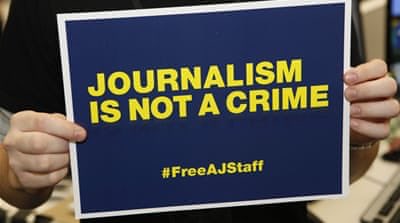
Journalists around the world had also joined forces to support Greste and his Al Jazeera colleagues, with #FreeGreste and #FreeAJstaff hashtags morphing to #JournalismIsNotACrime as Australian newsrooms were raided by police.

"I don’t think, frankly, I would be here now if it weren’t for the absolutely extraordinary social media campaign."
There were no such shows of government and media support for multi-award-winning Australian journalist Julian Assange, a card-carrying member of Australia’s journalist union since 2007.
In fact, Peter Greste himself penned a 2019 article for the Sydney Morning Herald where he declared that "Julian Assange is not a journalist, and WikiLeaks is not a news organisation". Greste, now a founding director of the loftily-named "Alliance for Journalists' Freedom", repeated the same old media smears that WikiLeaks simply "dumped" information online, putting lives at risk. Many prominent Australian journalists publicly supported his article.
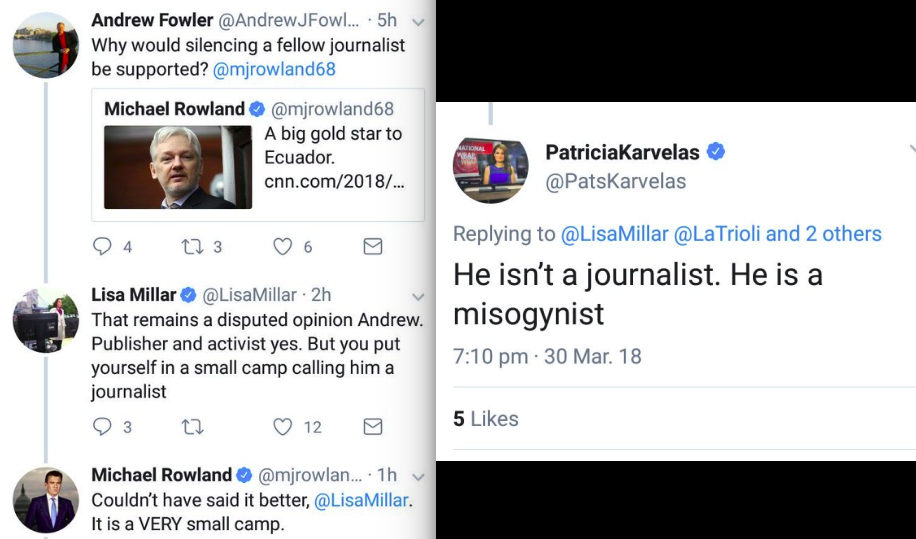
To illustrate his point, Greste pointed to a huge 2016 leak dubbed the "Panama Papers". He applauded how the International Consortium of Investigative Journalists (ICIJ) had handled over 11 million leaked documents from Panamanian law firm Mossack Fonseca.
The ICIJ did not simply publish and be damned. Instead, it compiled a team of journalists from 107 news organisations across 80 countries, who then spent more than a year going through that vast trove. They carefully dug out evidence that confirmed corruption, tax evasion and the evasion of international sanctions by some of the world’s most powerful business and political elites.
This was in fact the very same thing that WikiLeaks had been doing with various media partners for years. In fact, WikiLeaks had pioneered Big Data journalism and ICIJ was simply following their lead. So what was the real difference here?
The sheer size of the Panama Papers full archive - a whopping 2.6 terabytes of data, or approximately 2,660 GB - dwarfed the 1.7 GB WikiLeaks Cablegate release. Edward Snowden rightly called it the "biggest leak in the history of data journalism". But very little of the Panama Papers data was ever released, much of that was heavily redacted, and selected portions were sold for profit without any public scrutiny. When WikiLeaks launched a Twitter poll asking whether the full Panama Papers archive should be made available online, 95% of the 92,986 respondents said "YES, make them searchable"!
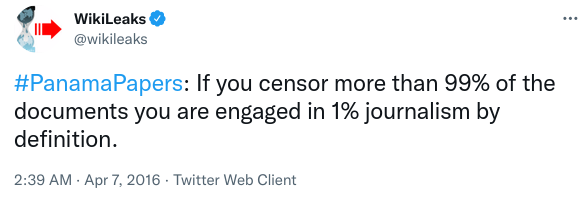
The initial burst of public excitement soon gave way to frustration and accusations that the ICIJ team was selectively protecting certain individuals or nations while exposing others for political reasons.
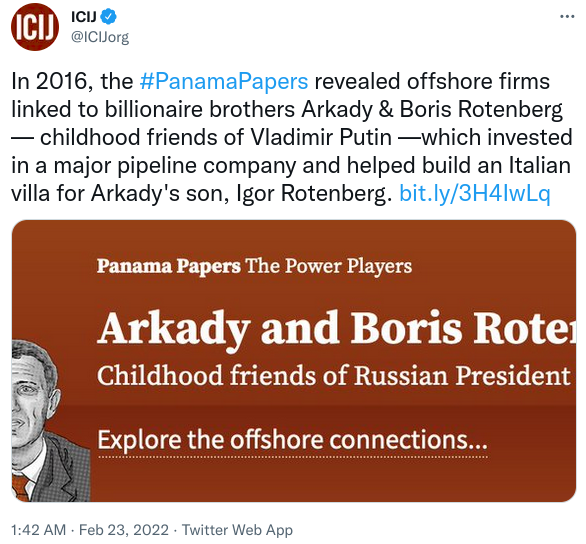
Russian media noted that the ICIJ, based in Washington DC, was funded by the Ford Foundation, the Carnegie Endowment think tank, the Rockefellers and George Soros. President Obama admitted that while no US leaders were mentioned in the Panama Papers, "folks in America are taking advantage of the same stuff". He said the problem was not that people were breaking the law, but that the laws were "poorly designed". Kristin Hrafnsson wryly suggested that the released information "seems to be skewed away from American interests".
"We’re not WikiLeaks," ICIJ Director Gerard Ryle told WIRED magazine. "We’re trying to show that journalism can be done responsibly."
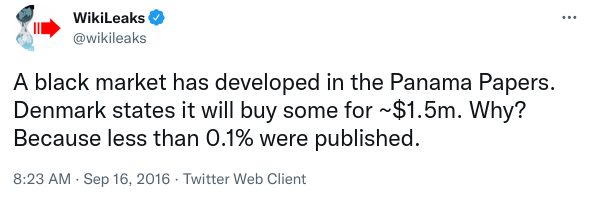
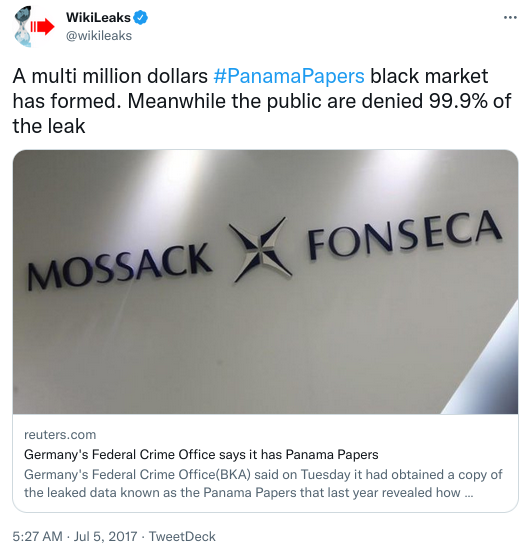
Countless anguished "What Even IS Journalism?" articles had been published since WikiLeaks dragged the failing media industry into the 21st Century. Assange was not only a journalist but a damn sight better journalist than any of his media critics. He was also an editor and a publisher. He had as much right as anyone to press freedom protections, yet his own supposed colleagues were ganging up to strip him of those protections. Why?
As his good friend John Pilger explained:
Journalism students might well study this period to understand that the most ubiquitous source of "fake news" is from within a media self-ordained with a false respectability and an extension of the authority and power it claims to challenge but courts and protects.
*
While journalists and officials were free to spread smears, lies, and even death threats against Assange in the media, governments were also working to crack down on free speech, repeatedly citing the danger of "fake news" on social media in particular. In January 2015, the British government announced the establishment of a new military unit, with 2,000 members, to be called the 77th Brigade:
The British military is to form a new specialist force in “non-lethal” forms of psychological warfare using social media such as Twitter and Facebook to tackle the “asymmetric battlefields” of the 21st century.
The unit aimed to "respond to the ever changing character of modern conflict" by "shaping behavior through the use of dynamic narratives.” In other words, propaganda. A British Army reservist working with the 77th Brigade was later revealed to be also working as a Twitter editor with control of Middle East content.
Also in January 2015, the BBC announced a 3-part TV sitcom, based on Assange’s travails, co-written by a comedian who had repeatedly called for the Wikileaks founder’s death.

The author dismissed his tweets as jokes and deleted them, but the rhetoric was on a par with repeated death threats in the US media, which were certainly not jokes. The BBC ignored complaints about the show.
*
Health Problems
On 2 March 2015, in a Swiss TV interview, Julian Assange briefly mentioned the difficulty he was experiencing getting medical and dental care inside the embassy.
“They say their insurance doesn’t cover Ecuador if they’re British doctors,” he shrugged.
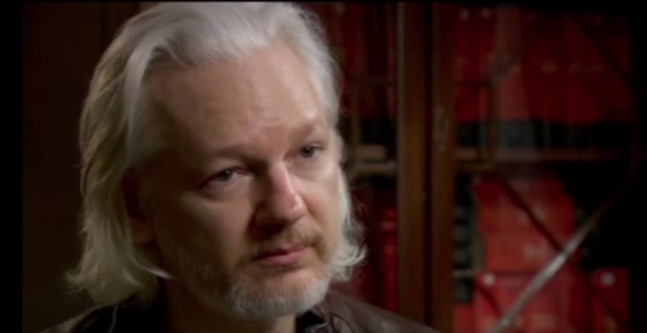
Assange was reluctant to complain, not wanting to give his enemies the satisfaction of knowing he was in pain, but in fact his conditions in the embassy were already taking a serious toll on his health. And it only got worse in years to come.
In May 2015, Assange managed to get a dentist to come and examine a broken tooth. The dentist said he required either root canal treatment or an extraction, neither of which could be safely performed inside the embassy.
In August 2015, a doctor visited the embassy after Assange complained that his right shoulder was causing sharp pain. The doctor recommended an MRI (magnetic resonance imaging) scan, which also could not be done in the embassy.
In October 2015, Britain turned down Ecuador’s request for Assange to temporarily leave the embassy to get an MRI scan. Ecuador’s Foreign Minister Ricardo Patino explained that they had only requested a "special safe passage permission that would last just a few hours".
"The reply we have had from Britain is that he can leave whenever he likes for any medical care he might need but the European arrest warrant for Assange is still valid. In other words, he can leave - and we will put him in jail."

On 2 December 2015 the same doctor returned to the embassy and said Assange’s shoulder pain had now "worsened considerably". He said Assange was experiencing "constant pain at rest, which is exacerbated by all movements of the shoulder joint."
In 2016 WikiLeaks released the medical reports from the dentist and doctor above, along with a twenty-seven page psycho-social and medical assessment from 10 November 2015, which was "by far the most detailed insight into the circumstances of his life inside the Embassy."
The report stated that Mr Assange was understandably reticent to disclose either physical or personal matters related to his mental health in case they were used against him, so it was necessary to also rely on evidence from his close contacts. It said Assange’s day to day existence in the embassy was "one of isolation, profound sleep disturbance and sensory deprivation; as well as hypervigilance due to the police operation." In many ways his conditions were worse than prison.
Mr Assange needs - at the bare minimum - access to fresh air, sunlight and exercise space on a daily basis. Mr Assange has been living under very restrictive conditions for over forty months. The unusual circumstances place Mr. Assange in a precarious situation. The effects of the situation on Mr. Assange’s health and well-being are serious and the risks will most certainly escalate with the potential to becoming life threatening if current conditions persist.
*
Sweden Backs Down
On 13 March 2015, after mounting public criticism (see previous chapter), Swedish Prosecutor Marianne Ny changed her mind about interrogating Julian Assange in London, and finally asked to come and question him in the embassy. Assange’s lawyers began lengthy discussions with Swedish prosecutors, Ecuadorian officials, and the British government in order to agree precisely when, where, and how the questioning would occur. By late August 2015 they still had not come to an agreement, so the five year statute of limitations on Anna Ardin’s allegations expired.
UK Foreign Minister Hugo Swire blamed Ecuador and Assange for preventing the proper course of justice, even though it was British Crown Prosecutors who had told Ny not to come and question Assange five years earlier.
Ny did not ultimately enter the embassy to discuss Sofia Wilen’s remaining allegations of "lesser degree rape", which had a ten year statute of limitations, until 14 November 2016.
*
Sony Leaks
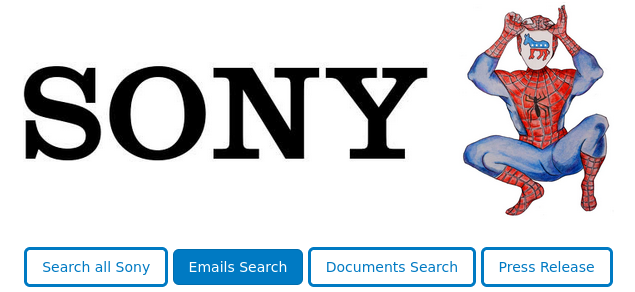
On 16 April 2015, WikiLeaks released The Sony Archives: 30,287 documents from Sony Pictures Entertainment (SPE) and 173,132 emails "to and from more than 2,200 SPE email addresses". The data was originally leaked in November 2014 by hackers, widely believed to be a North Korean front or sympathizers, in protest against a Sony movie, The Interview, which mocked the North Korean leader Kim Jong-Un.
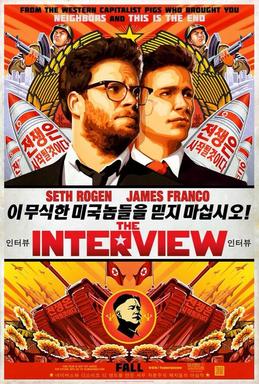
"It depicted, in graphic detail, Kim’s head being blown apart by a guided missile fired by fed-up North Korean 'elites' who had come over to the U.S. side after their conversations with the fake American journalists, played by Rogen and his sidekick James Franco."
The data was originally dumped on free torrents sites but the MS Exchange server formatting made the contents difficult to read, and the torrents were removed after threats from the Obama White House. WikiLeaks posted the documents and emails in an easy-to-search database.
"This archive shows the inner workings of an influential multinational corporation," Julian Assange said. "It is newsworthy and at the centre of a geo-political conflict. It belongs in the public domain. WikiLeaks will ensure it stays there."
The leaked data revealed that SPE, a US subsidiary of the Japanese multinational corporation Sony, had direct ties to the White House and the US military-industrial complex, providing opportunities for Sony to influence laws and policies in exchange for propaganda and silence. There were plenty of cozy deals between SPE and the US Democratic Party, as well as SPE and the warmongering RAND Corporation (SPE CEO Michael Lynton was on RAND’s board of trustees}.
Leaked emails revealed the Sony CEO having an "intimate dinner" with Israeli Prime Minister Benjamin Netanyahu, plus discussion of how Sony cameras were being used on the guidance systems of Israeli missiles. Sony executives also discussed WikiLeaks' publication of the Trans-Pacific Partnership (TPP) IP Chapter and the New Zealand extradition case against Megaupload founder Kim DotCom, as part of SPE’s "war on piracy".
A Sony Pictures executive was fired in the wake of the leaks, after an agument about an upcoming Steve Jobs film was published, and the Hollywood’s "Project Goliath" campaign against Google was exposed in detail. There was also lots of juicy celebrity gossip: actresses receiving lower fees than their male co-stars; producers and executives insulting celebrities (Leonardo DiCaprio was labeled "despicable" after he turned down a role); and a legal agreement ensuring Spiderman’s movie character could never be black or gay.
An additional 276,394 new Sony documents were released in June 2015. WikiLeaks claimed the latest files included "legal entanglements including an investigation for bribery".
The fallout from the Sony leaks continued for years to come, providing valuable new insight into President Donald Trump’s on-off relationship with the North Korean leader, and insider opinions on producer Hervey Weinstein, whose multiple rape convictions sparked the #MeToo movement.
*
Trident Nukes
On the evening of 17 May 2015, WikiLeaks published a 17 page report from a UK Navy whistle-blower, William McNeilly, which documented his extensive concerns about the safety of Britain’s Trident nuclear submarines. A modified version of the report had been posted earlier in the day by the Scottish Sunday Herald, but WikiLeaks detailed a comprehensive list of differences between the original report and the media version.
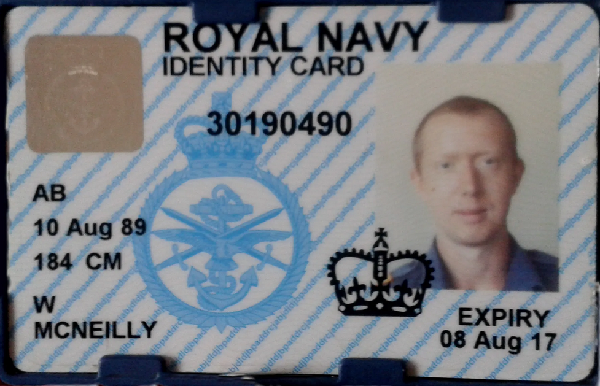
"Please make sure this information is released. I don’t want to be in prison without anyone knowing the truth… We are so close to a nuclear disaster it is shocking, and yet everybody is accepting the risk to the public."
The original report had been posted online nearly two weeks earlier but it had received little attention. McNeilly handed himself over to Scottish police the next day and was remanded in custody at his military base. Curiously, the Ministry of Defence decided not to prosecute him under the Official Secrets Act, which would have resulted in an embarrassing public trial. Instead, they dismissed the allegations as "anecdotal" rather than secret. McNeilly was dishonourably discharged a month later.
“When I joined the Royal Navy, I had no idea that I was going to work with nuclear weapons. When I found out, I was happy. I used to think they were an essential tool in maintaining peace, by deterring war. It wasn’t until I saw the major safety and security issues that I realised the system is more of a threat than a deterrent.”
*
The Saudi Cables
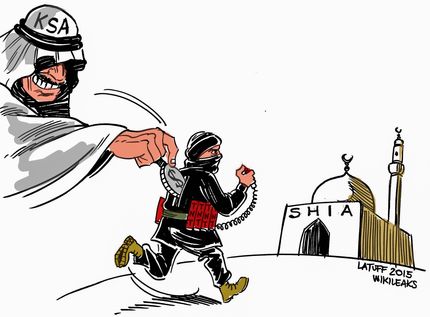
On 19 June 2015 - exactly three years since Julian Assange entered the Ecuadorian Embassy - WikiLeaks began releasing The Saudi Cables: over 500,000 cables and other documents from the Saudi Foreign Ministry and various Saudi embassies around the world, including "Top Secret" reports from the Ministry of Interior and General Intelligence Services. Julian Assange said the Saudi Cables "lift the lid on a increasingly erratic and secretive dictatorship that has not only celebrated its 100th beheading this year, but which has also become a menace to its neighbours and itself."
The Saudi Cables provide key insights into the Kingdom’s operations and how it has managed its alliances and consolidated its position as a regional Middle East superpower, including through bribing and co-opting key individuals and institutions. The cables also illustrate the highly centralised bureaucratic structure of the Kingdom, where even the most minute issues are addressed by the most senior officials.
WikiLeaks had managed to convert hundreds of thousands of pages of scanned images of Arabic text into a searchable database, which they declared "a major journalistic research effort". Files were searchable in Arabic and English, with around 70,000 documents included in the initial release. By now, WikiLeaks had learned that releasing huge troves of data in smaller batches was the best way to ensure ongoing media interest. They hinted that the source of their files might be a group called the Yemeni Cyber Army, who were reported to have hacked the Saudi Foreign Ministry in May 2015.

One cable revealed that Saudi officials were linked to the Haqqani network, a jihadist Afghan group. Another cable revealed a memo from Hillary Clinton admitting that "donors in Saudi Arabia constitute the most significant source of funding to Sunni terrorist groups worldwide." Another cable showed that the Saudis were spending millions of dollars to promote their fundamentalist Wahhabi brand of Sunni Islam religion in India.
Another deeply embarrassing cable showed that in November 2013, British and Saudi diplomats had agreed to support each other’s election to the UN Human Rights Council, despite the Saudi government’s horrendous record on human rights. Both countries were subsequently elected to the 47-member council. UK PM David Cameron responded by claiming the Saudis had helped stop a terrorist attack in Britain and he was opposed to the death penalty, but his attempts to brush off this "squalid" deal were described as "excruciating".
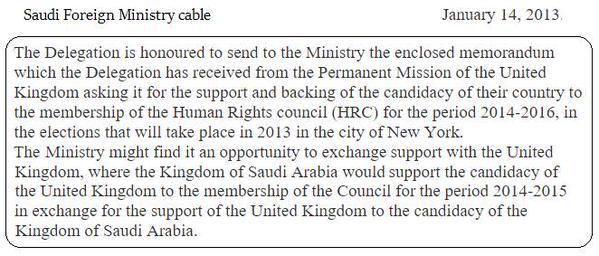
Other Saudi cables showed concerns that Syria’s President Assad would create an Alawite state and drive Sunnis from Homs & Rastan, plus threats to destroy the Syrian state.
In November 2015, after publishing over 122,000 Saudi documents, WikiLeaks noted that the Kingdom had just executed their 100th prisoner that year, and yet there was no coverage of this in Arab media. They released an article explaining how the Saudis were "buying silence" to control regional media.
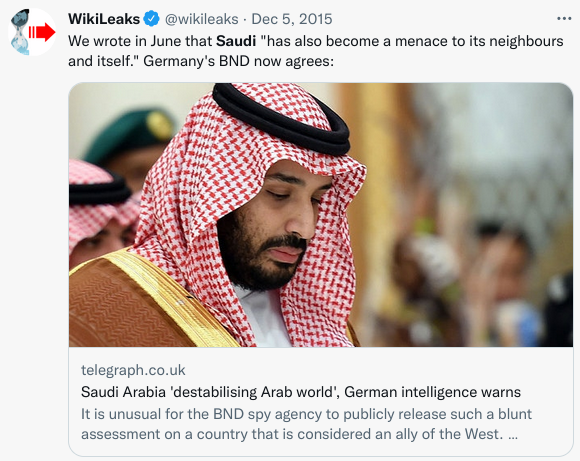
*
Espionnage Élysée
On 23 June 2015 - just five days after they began rolling out the Saudi Cables - WikiLeaks began publishing a collection of files from the US National Security Agency (NSA) that exposed ten years of US espionage on successive French governments. The release was titled "Espionnage Élysée" after the official residence of the French President, the Élysée Palace.
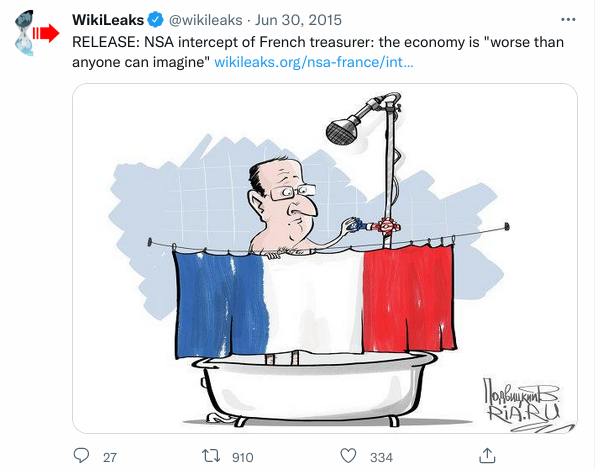
The files showed that France, a US ally, was being routinely targeted by US intelligence agencies, just like the German government (as revealed by Edward Snowden’s leaks). Additional files - even more explosive - were published a week later. While most material released by WikiLeaks was only rated "Classified" or "Secret", this material included "TOP SECRET" files.
To help promote the release, WikiLeaks provided a packaged list of highlights for lazy journalists, including links, dates, classification details, and brief descriptions:

-
EU and French diplomats who strongly criticize U.S. trade policies and call TPP treaty a confrontation against China.
-
High-ranking French official complaining about President Sarkozy’s inflammatory and inaccurate statements on WTO that no-one in government backs
-
French ministerial agenda for planned G7 and G20 meeting intercepted
-
French economy in dire straits according to intercepted communications between French Finance Minister and French Senator
-
Spying on French Ambassador who contemplated exposing U.S. misuse of UN Oil-for-food program in Iraq
-
NSA Eavesdrops as Hollande Tries End Run Around Merkel on Greek Eurozone Exit
-
US Intercepts of France Complaining About US Intercepts of France
-
US Spying On Chirac Discussing UN Appointments
-
US Spying on Sarkozy Talking Tough on Israel-Palestine
-
US Eavesdrops as Sarkozy Plots French Leadership on Financial Crisis
"The United States has been conducting economic espionage against France for more than a decade," said Julian Assange. "Not only has it spied on the French Finance Minister, it has ordered the interception of every French company contract or negotiation valued at more than $200 million. That covers not only all of France’s major companies, from BNP Paribas, AXA and Credit Agricole to Peugeot and Renault, Total and Orange, but it also affects the major French farming associations. $200 million is roughly 3,000 French jobs. Hundreds of such contracts are signed every year. The United States not only uses the results of this spying itself, but swaps these intercepts with the United Kingdom. Do French citizens deserve to know that their country is being taken to the cleaners by the spies of supposedly allied countries? Mais oui!"
On 3 July 2015 Julian Assange published an article in France’s "Le Monde" newspaper, asking President François Holland to grant him asylum:
"For the simple fact of having published information of public interest that anonymous sources transmitted to WikiLeaks, I am personally prosecuted for espionage, conspiracy to spy, theft, or compromise of property of the United States government, violation of the law on computer fraud, and general conspiracy, risking life imprisonment or worse. The United States has since expanded its investigation to include my alleged assistance to Mr Snowden in preserving his life and obtaining asylum; and it is, according to several journalistic sources, already doing the same with regard to the publication of [Espionnage Élysée] concerning the tapping which affected you, Mr President…"
“My life is in danger today, Mr President, and my integrity, both physical and psychological, is, with each passing day, a little more threatened.”
Although the plea for asylum was supported by prominent French voices, including soccer legend Eric Cantona and economist Thomas Piketty, President Hollande quickly turned it down:
"France cannot act on his request. The situation of Mr Assange does not present an immediate danger. He is also the subject of a European arrest warrant…"
Hollande is remembered as the most unpopular president of the French Fifth Republic, with an approval rating of just 4% before he quit politics in 2017.
*
Premature Obituaries
The French President may not have been moved into action by the latest WikiLeaks release, but WIRED magazine was certainly impressed.
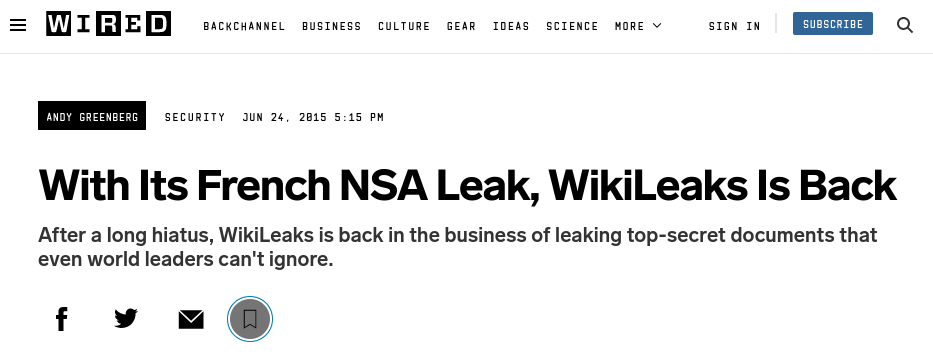
For the past five years, uninformed media insiders had repeatedly dismissed WikiLeaks as a one-off success story, peaking with the Manning leaks, that was already finished. Kristinn Hrafnsson gave the WIRED team a reality check:
"You’re assuming we went away," he said. "It has been a natural phenomenon since 2010 to proclaim that WikiLeaks is dead. The news of our death has been greatly exaggerated."
Hrafnsson explained that WikiLeaks had "scaled down" after three years "without significant funds" but had now significantly strengthened their infrastructure:
"Our ability to process huge databases has grown, we’ve expanded our network of media alliances. We are in a much stronger position in many ways than we were five years ago. Of course we depend on the materials that whistleblowers and sources want to contribute to our website for publication. But we’re ready to take off."
*
More NSA Leaks
During July 2015, WikiLeaks published a steady stream of additional NSA leaks, prompting some observers to wonder if these might be files from the Snowden archive that the Guardian and Washington Post had declined to publish. Or had Snowden’s courage inspired other NSA insiders to take action?
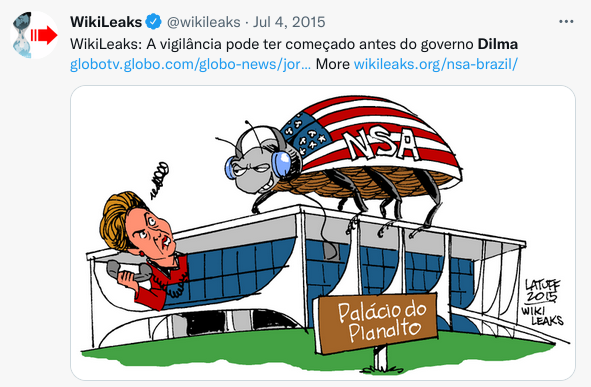
On 4 July 2015 WikiLeaks published documents which showed that the NSA was spying on 29 government phone numbers in Brazil. The targets included President Dilma Rousseff, her assistants and advisors, plus the head of Brazil’s Central Bank, the Foreign Minister, and Brazilian ambassadors to Germany, France, the EU, the US and Geneva. WikiLeaks accused the USA of waging "an economic espionage campaign"
The release was particularly embarrassing because Rousseff had just visited US President Obama, not realising that even the phone in her Presidential jet was bugged. Julian Assange argued that President Rousseff could not assure Brazilian companies that their US counterparts would not have an unfair advantage unless she could "really guarantee the spying has stopped".
Rousseff was impeached for corruption and removed from office the following year.
*
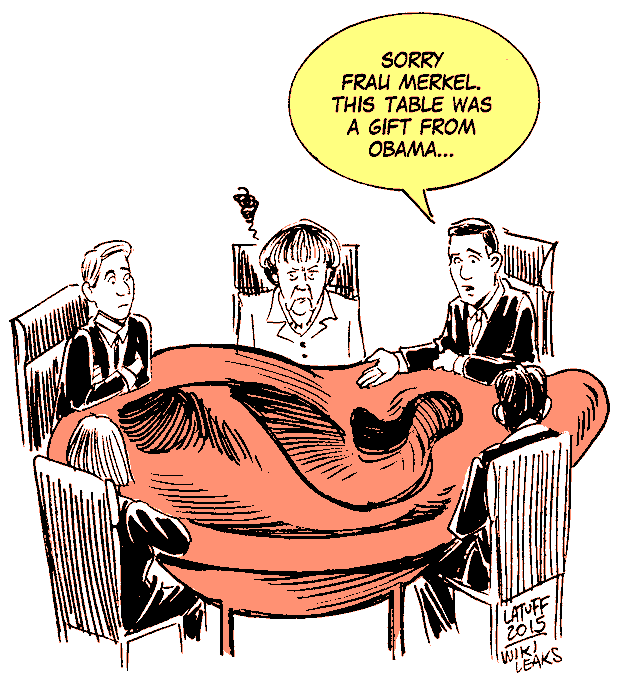
On 20 July WikiLeaks published evidence of further NSA spying on Germany’s government, including Foreign Minister Frank-Walter Steinmeier (who became President of Germany in 2017) and his senior staff. The Wikileaks release included a list of 56 bugged German government phone numbers, about half of them still in use by German Chancellor Angela Merkel’s close contacts. German magazine Der Spiegel announced that it had also been bugged for years and filed a complaint.
One intercept followed a meeting between the German Foreign Minister and US Secretary of State Condoleezza Rice on 29 November 2005, when clandestine CIA "rendition flights" were in the media spotlight. It showed that Steinmeier deliberately avoided asking hard questions, and Rice was delighted not to the hear them. Julian Assange said the evidence proved that the NSA had been helping the CIA kidnap and torture people "with the tacit complicity of European governments".
"In 2005 German Foreign Minister Steinmeier was thrilled that his tactic of asking Condoleezza Rice no hard questions about CIA renditions had worked. The US said nothing that would require him to do anything. And how do we know about it? Because the National Security Agency was gloating to the US senior executive about intercepting this cowardly display. Nobody comes out of this looking good."
Whereas Snowden had revealed NSA spying on Merkel, WikiLeaks showed that her predecessors Gerhard Schröder and Helmut Kohl were also targetted by decades of NSA spying. Germany’s Attorney General, who had already dropped an investigation into the tapping of Merkel’s phone, announced that these new reports would also be investigated. Merkel herself avoided public commentary but her political opponents demanded action. The Chairman of the German Greens accused the government of running a cover up instead of a serious investigation.
"Mrs. Merkel must now find clear words for Obama," said the chairman of Germany’s Social Democrats Party (SDP). "It can’t go on like this.”
An alliance including the Greens and SDP defeated Merkel’s Christian Conservative alliance in 2021.
*
On 31 July WikiLeaks released a list of 35 NSA targets in Japan, including the Japanese cabinet and major Japanese companies, along with "intercepts relating to US-Japan relations, trade negotiations and sensitive climate change strategy".
The list indicates that NSA spying on Japanese conglomerates, government officials, ministries and senior advisers extends back at least as far as the first administration of Prime Minister Shinzo Abe, which lasted from September 2006 until September 2007. The telephone interception target list includes the switchboard for the Japanese Cabinet Office; the executive secretary to the Chief Cabinet Secretary Yoshihide Suga; a line described as "Government VIP Line"; numerous officials within the Japanese Central Bank, including Governor Haruhiko Kuroda; the home phone number of at least one Central Bank official; numerous numbers within the Japanese Finance Ministry; the Japanese Minister for Economy, Trade and Industry Yoichi Miyazawa; the Natural Gas Division of Mitsubishi; and the Petroleum Division of Mitsui.
Today’s publication also contains NSA reports from intercepts of senior Japanese government officials. Four of the reports are classified TOP SECRET. One of the reports is marked "REL TO USA, AUS, CAN, GBR, NZL", meaning it has been formally authorised to be released to the United States' "Five Eyes" intelligence partners: Australia, Canada, Great Britain and New Zealand.
Sarah Harrison, described as "WikiLeaks Investigations Editor", asked whether Japan’s current industry and climate change proposals might be more effective if their communications had been better protected. Julian Assange pointed out that the documents revealed that the USA was spying on Japanese leaders even while they discussed what they should and should not reveal to their US counterparts.
"The lesson for Japan is this: do not expect a global surveillance superpower to act with honour or respect. There is only one rule: there are no rules."
US officials initially stated that they did not think the new revelations would cause a problem, but work was suspended at the huge US naval base in Okinawa after locals protested. Japanese Prime Minister Shinzo Abe spoke to US Vice President Joe Biden, demanding an investigation. President Obama then called Abe to apologize for “causing trouble”.
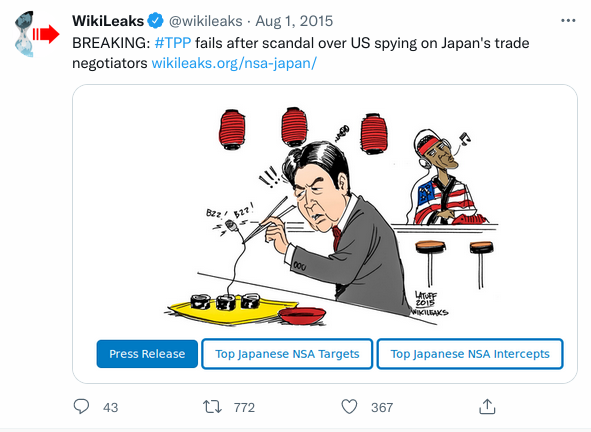
*
CIA Director Gets Hacked
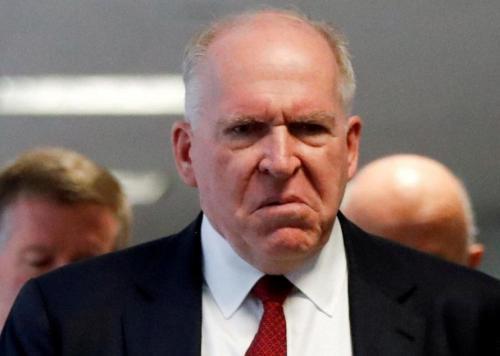
On 22 October 2015 WikiLeaks began releasing emails and other documents from CIA Director John Brennan (above). The files included a 47-page security clearance application from 2008, when Brennan rejoined the CIA after 25 years in private business, plus a letter about the use of “harsh interrogation techniques” on terrorism suspects, and personal information of more than a dozen top US intelligence officials. The leaked documents also showed that the CIA had considered Brennan’s private company "The Analysis Corp" to be deeply incompetent and misleading.
The New York Post reported that the emails and attachments had been hacked by a teenager who was working with a group called Crackas With Attitude (CWA). He said he was motivated by opposition to US foreign policy and he had been repeatedly prank-calling the CIA Director for months, once reciting Brennan’s Social Security number to him.
“He waited a tiny bit and hung up,” the hacker said.
The hacker later explained to WIRED how he and two others got access to Bennan’s AOL email account after tricking his phone company into handing over personal details. Like Hillary Clinton, Brennan had been using his unsecured personal email account for work-related issues.
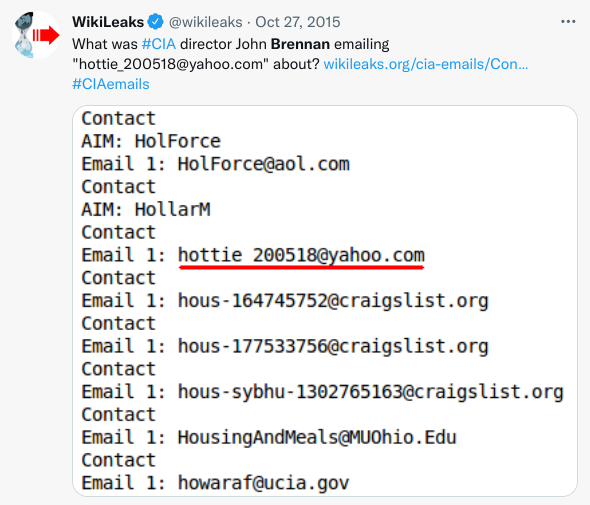
When he realised that he had been hacked, Brennan repeatedly tried to re-set his password, only for the hackers to hijack the account again. And again. And again. Finally they phoned him again over VoIP:
"Hey… its CWA."
"What do you want?"
"2 trillion dollars hahhaa, just joking."
"How much do you really want?"
"We just want Palestine to be free and for you to stop killing innocent people."
*
The Met Pulls Out
Since entering the Ecuadorian embassy in London, Julian Assange had repeatedly stated that he wanted to walk out a free man, vindicated by the law, and he was not seeking to escape into a life on the run. Supporters had speculated about wild rescue operations via helicopters, jet-packs, or treks though London sewer tunnels, but Assange preferred to keep working from inside the embassy for as long as necessary.
On 12 Octobe 2015 the London Metropolitan Police Service (MPS) announced the end of their three-year long, 24-hour guard outside the embassy. The total cost of the operation, which began in June 2012, was estimated to be over £12 million. A police statement said it was “no longer proportionate to commit officers to a permanent presence”.
“The MPS will not discuss what form its continuing operation will take or the resourcing implications surrounding it. Whilst no tactics guarantee success in the event of Julian Assange leaving the embassy, the MPS will deploy a number of overt and covert tactics to arrest him.”
Kristinn Hrafnsson said the reduced police presence “does not fundamentally change the situation” and suggested that it could be just a political tactic to transfer the public costs of a uniformed police presence to a more secretive covert operation. He noted that the United Nations Working Group on Arbitrary Detention (UNWGAD), which had been investigating the Assange case in conjunction with the UK and Swedish governments for many months, was expected to reveal their findings soon. He expected them to find in favour of the WikiLeaks founder.
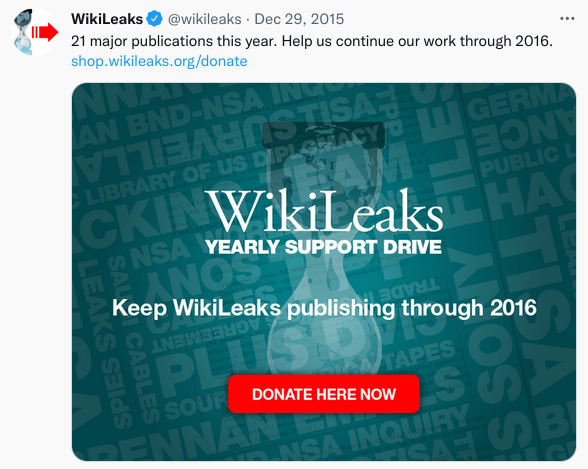
*
The author of this book can be found on Twitter: @Jaraparilla
*
Home - Genesis - 2007 - 2008 - 2009 - Early 2010 - Mid 2010 - Late 2010 - End 2010 - Early 2011 - Mid 2011 - Late 2011 - End 2011 - Early 2012 - Late 2012 - Early 2013- Late 2013 - 2014 - 2015 - Early 2016 - Late 2016 - 2017-19
Copyright Gary Lord 2021, 2022, 2023